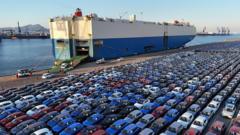President Trump's upcoming tariffs, dubbed "Liberation Day," are perceived as a threat that could alienate key U.S. allies while prompting retaliation that may harm American farmers and consumers.
The Impending 'Liberation Day' Tariffs: A Double-Edged Sword for U.S. Alliances

The Impending 'Liberation Day' Tariffs: A Double-Edged Sword for U.S. Alliances
As President Trump prepares to impose significant tariffs, globally allied nations react, raising concerns over the potential consequences for international relations and the American economy.
President Trump's announcement of his "Liberation Day" tariffs, set to occur on Wednesday, has generated significant concerns among U.S. allies and market stakeholders alike. With the new German chancellor signaling a push for independence from the U.S. and Canada's prime minister declaring an end to their traditional close ties, the geopolitical landscape appears increasingly precarious. Poland's president has even suggested the pursuit of nuclear armament, while Greenland's prime minister expressed strong resistance to U.S. assertions over its territory.
These threats and critical remarks stem from Trump's prior comments about NATO allies and the European Union, which he accused of undermining U.S. interests. The anticipated tariffs are expected to target not just adversaries like China but also erstwhile allies, leading to a wave of unease among political leaders globally.
Despite the mounting tensions, Trump administration officials remain focused on pushing forward with the tariffs without addressing the potential ramifications for consumers and farmers in the U.S., including the fallout from retaliation. There seems to be a lack of transparency regarding any cost-benefit analysis of these policies. As President Trump embarks on this bold economic strategy, the broader implications for U.S. alliances remain a focal point of concern, signaling a troubled global trade environment.





















